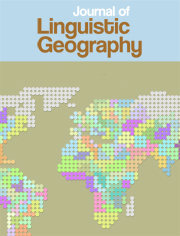Article contents
Dialect Contact and the Acadian French Subjunctive: A Cross-Varietal Study
Published online by Cambridge University Press: 20 July 2018
Abstract
This study investigates mood choice for five Acadian French communities in Atlantic Canada which have intertwined settlement histories but which differ in terms of type and degree of dialect contact. The two communities with least contact with supralocal French preserve the highly salient imperfect subjunctive, moribund or absent from most other present-day spoken French varieties. While four communities exhibit high selection rates for the present subjunctive, in line with variationist analyses of other French varieties, one community has surprisingly low rates of such usage, along with absence of the imperfect subjunctive. This dichotomy is explained by the local prestige of the smaller of two founder groups for the community, settlers from Haute-Bretagne, France, a dialect area for which the historical record reveals low levels of subjunctive forms. The results highlight the importance not only of demographic factors but also of local identity construction in the formation of new contact varieties.
- Type
- Articles
- Information
- Copyright
- Copyright © Cambridge University Press 2018
References
- 6
- Cited by


